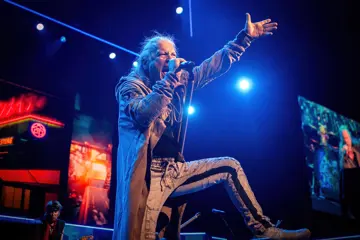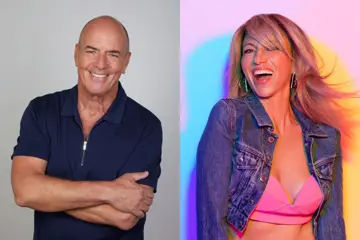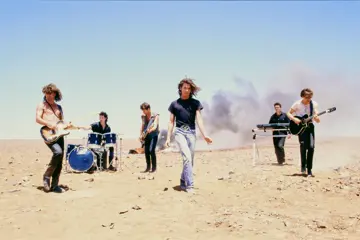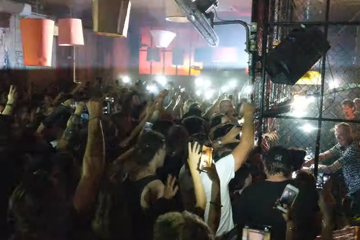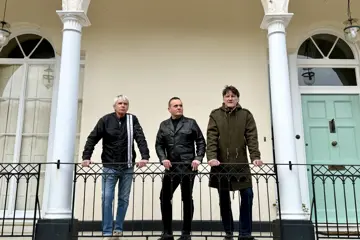Take the blue pill and you live the blissful ignorance of illusion. Take the red pill and you accept the harsh truth of reality.
Take the wrong pill, you lose your life.
Mike Baird appeared to be opting for the fairy land of the blue pill when he told Sunrise his solution to preventing drug related deaths at music festivals. "Don't do it. That's the best form of safety you can do. Don't take the pills and you'll be fine." Remind anyone of a certain campaign headed by Nancy Reagan?
It's time to accept the difficulties posed by the real, red pill situation at hand — people take drugs. They will continue to take drugs. We either work with it to reduce the number of casualties, or we stand back shrugging our shoulders protesting "Just say no!" as bad choices kill our kids.
Music festivals and youth culture are synonymous with drugs. It doesn't make it right, it doesn't make it safe, but it is ingrained into the fabric of our society. According to the most recent National Drug Strategy Household survey, 41.8% of Australians aged 14 years and over had used illicit drugs in their lifetime. Around three million have done so in the past 12 months.
Annabel Catt was my dance teacher. She took a pill of ecstasy in 2007 at Good Vibrations festival when she was 20, and died. I don't remember much about the weeks following her death, but I do remember my mum having a big heart-to-heart with me, age 14, about the dangers of taking drugs at music festivals.
Don't miss a beat with our FREE daily newsletter
I took my first pill when I was 16 years old at Big Day Out. Instead of thinking about Annabel and the warnings that had been drilled into me, I was more concerned about the effects of the drug wearing off before I got home that evening.
The debate around pill testing at music festivals seems to fall into two lines of argument. For the opposition, free and readily available drug testing will merely encourage people to use drugs and inadvertently (and unofficially) legalise their use. For the support, it is more important to prevent deaths from 'bad' drugs than attempt to apprehend everyone bringing them in, which is a futile task.
People slip through the cracks. The number of hospitalisations for ecstasy users has almost doubled in the past six years. Most recently, two people died and one was put in an induced coma after allegedly taking pills at the 2015 Stereosonic festivals. 212 people received medical treatment and five were taken to hospital at a recent Sydney festival. Stereosonic has publicly backed pill testing. Baird's incredibly naive statement doesn't account for the fact that youth don't always do what you tell them.
For those who don't quite grasp this concept, here's an analogy I tell my parents:
You see ad campaigns everywhere telling you that cigarettes will give you lung cancer. You're faced with terrifying images of missing limbs, rotten teeth, lungs filled with tar. You read heartbreaking accounts of the slow, painful death that seems to be almost unavoidable for pack-a-day smokers. It is common knowledge that cigarettes contain 43 cancer-causing additives. But in your teens and 20s these scare and education campaigns do little to make sure you never touch another cigarette in your lifetime.
Sadly, ignoring drug and alcohol education is all too common. We are inherently flawed beings who don't always do what is in our long-term best interest — like speeding, binge drinking, eating fatty food and not buying health insurance.
Don't stop educating people. Don't stop funding scare campaigns. Don't stop monitoring the gates of music festivals for dodgy people with dodgy supplies. Over time these preventative actions will take effect.
But for now, drug use and subsequent hospitalisations are on the rise. The latter is preventable — immediately — with drug testing on site. Punters are not likely to take their pills if they see an array of dangerous chemicals that are certainly not MDMA. The biggest issue we face isn't that people die of overdoses from taking too much; it's that people are using substances that they believe to be pure when in actual fact they contain something that could lead to a fatal reaction. It may be a bad choice buying the drugs in the first place, but give us some credit to not drink the bottle marked 'poison'.
There's also the secondary argument that a stronger, more aggressive police presence attempting to totally eradicate drugs from the festival environment can potentially increase the number of casualties. Put it this way: if you've got three pills for the day and the group in front of you have just been searched, what are you going to do with your stash in the heat of the moment?
Baird argues that pill testing is using taxpayer money to fund illegal drug dealers. This reasoning is flawed. We're not giving money to dealers; we're setting up a system that can effectively reduce the number of deaths once people have already obtained their substances. You can't argue that the public health system's spending on treatment for diabetes is funding the fast food industry or that it suggests we should gorge ourselves on junk because "Hey, we can stop you from dying once you're about to have a heart attack."
Preventative pill testing will reduce the amount of money spent on ambulances, hospital beds, and emergency procedures. It will once again make music festivals synonymous with celebration, not disaster. Pill testing is a preventative approach that will help us to make informed choices once we know the full extent of the risk. Not every pill will kill you.
The drug that killed Annabel wasn't in fact ecstasy, as she had thought. It was a lethal drug called paramethoxyamphetamine, aka Dr Death, which causes kidney failure, extremely high body temperature, convulsions and seizures, coma and death. It's commonly found in pills sold as ecstasy. It is detectable in a pill test.
A safe haven to check the legitimacy of your drugs won't increase their use exponentially in much the same way education campaigns won't reduce use immediately. Drug taking is something that governments need to work with in a safe way, lest we lose more kids to 'stupid choices' while Mike Baird blocks his ears, takes the blue pill and continues to argue "don't do it".

